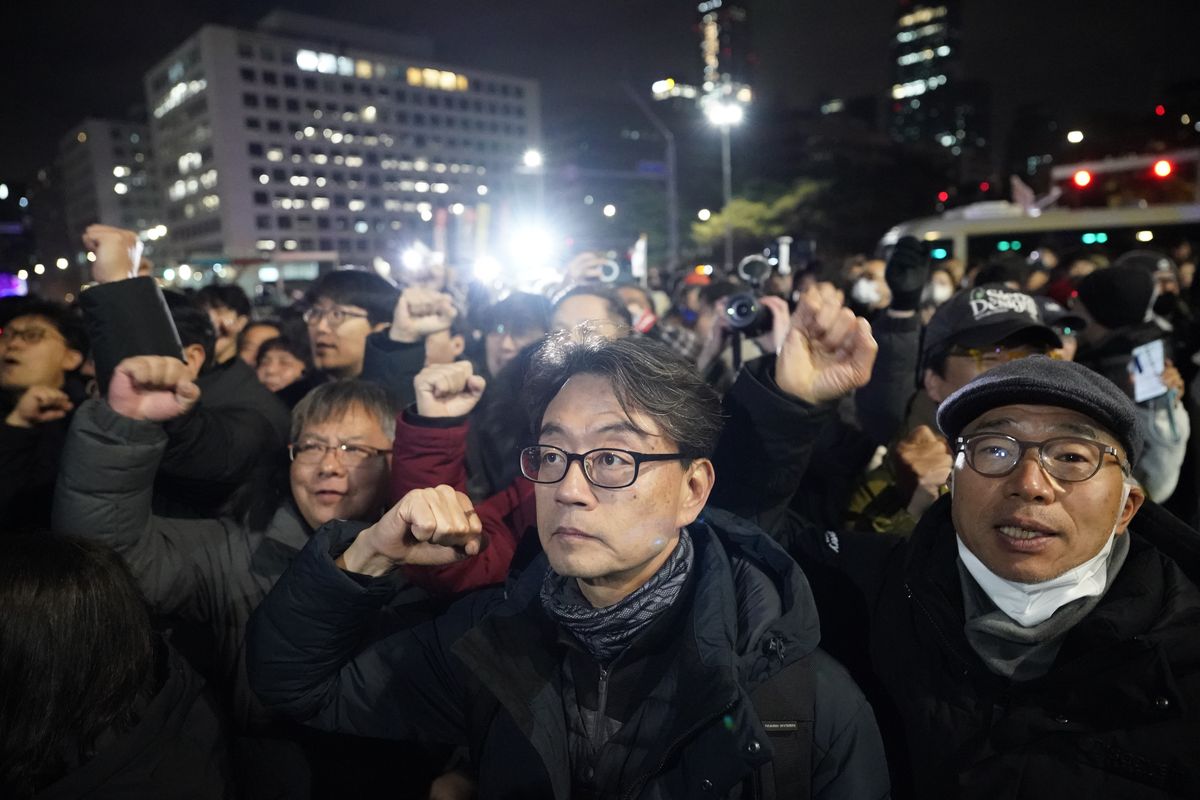South Korean president declares martial law; parliament votes it down

SEOUL – South Korean President Yoon Suk Yeol declared “emergency martial law” Tuesday evening in frustration with the opposition-dominated parliament he claimed was paralyzing the government.
It was the first time in more than four decades that martial law had been declared in the country. The decree prohibits all political activities, rallies and demonstrations, and subjects all media to martial law control.
Parliament convened a plenary session in response and within about two hours voted down the decree, a result greeted with applause by lawmakers. South Korean military officials, however, said the law will remain in place until the president lifts it, according to local media outlet YTN.
According to the South Korean Constitution, the president “shall comply” when the National Assembly requests the lifting of the martial law with a majority vote. It does not, however, specify a time frame for the president’s compliance.
A Biden administration official, speaking on the condition of anonymity to speak about sensitive diplomacy, said the White House has been in touch with South Korean officials and that the United States was “trying to learn more.”
President Joe Biden, after making remarks during his visit to Angola, was asked about the martial law decree in South Korea.
“I’m just getting briefed on it,” he said.
A chaotic scene unfolded outside the National Assembly shortly after the announcement of martial law, as police officers blockaded the entrance and residents began to arrive. Some South Korean lawmakers who had come for the plenary session needed to break through police barriers and enter through windows, according to South Korean media. Outside, protesters gathered, chanting: “Open the door!”
In the bitter cold, thousands of protesters cheered, waved tiny South Korean flags and sang in celebration at the news of the parliament’s vote to lift the law. The jubilant tone, however, was interspersed with chants to arrest the president.
By about 3 a.m., the crowd around the National Assembly building was starting to shrink, “but there is a strange mix of tension and calm,” reported The Washington Post’s Kelly Kasulis Cho.
Protesters blocked the entry of a black vehicle with tinted windows while police looked on, nonchalantly shaking hot packs to stay warm. A few demonstrators using microphones continued to shout and speak out against the president. Some held signs calling for President Yoon Suk Yeol’s impeachment.
Police presence started to thin out, with a small crowd gathered on the steps of the building. A helicopter appeared overhead – a rarity in Seoul, most of which is a no-fly zone.
The opposition Democratic Party controls the National Assembly, and the president’s conservative party, the People Power Party, is in the minority. Opposition to the declaration came swiftly from South Korean political leaders.
Han Dong-hoon, the chairman of President Yoon Suk Yeol’s People Power Party, called the president’s declaration of martial law “wrong” in a statement Tuesday.
“We will stop it along with the people,” he said.
Kim Song-won, 60, immediately came out to the National Assembly with his wife and daughter when he heard that martial law had been declared in the country.
“I was shocked,” he said, shortly after 1 a.m. local time. “I thought declaring martial law was an injustice, so I came out here.”
Surrounded by a dense crowd of protesters, he added that he felt “grateful” that so many others showed up.
Kim Yeon-hee, a 36-year-old South Korean office worker, stood at the perimeter of the massive crowd swelling the country’s National Assembly just after 1 a.m. She looked on solemnly as the crowd chanted, calling for the South Korean president’s arrest.
“I’ve only seen moments like this in the history books or in the movies,” Kim said.
She added that many South Koreans like her have been dissatisfied with President Yoon, particularly over his lack of apology for the deaths of 159 people in the tragic 2022 crowd crush during Halloween celebrations in Itaewon, a popular multicultural neighborhood in Seoul, and his inability to address the nation’s ongoing doctor’s strike, which has delayed surgeries and stretched queues at hospitals.
Seoul’s mayor, Oh Se-hoon, said in a statement that he opposes martial law and that the measure “must be repealed.” He said that as mayor, he would work “to protect the daily lives of the citizens.”
Former president Moon Jae-in, who took office after the impeachment of conservative president Park Geun-hye, posted on X: “Democracy in the Republic of Korea is in a critical state. I hope that the National Assembly will quickly step in and protect the collapsing democracy. I also ask the citizens to unite in protecting and reviving democracy.”
The surprise declaration of martial law sent shock waves Tuesday evening in a country where a democratic uprising toppled a military regime less than four decades ago.
Yoon accused the political opposition of “antistate” activities and said he sought to “eradicate pro-North Korean forces,” but he did not cite any specific threats from the North. Instead, he charged that his liberal political opponents were paralyzing the government with an “unprecedented” number of impeachment motions.
The decree, issued at 11 p.m. Tuesday by army Gen. Park An-soo, the martial law commander, prohibited all political activities, rallies and demonstrations. It also banned acts that attempt to “overthrow the liberal democratic system” and subjected all media and publications to martial law control.
The South Korean won was down sharply against the U.S. dollar – about 1,420 KRW to $1 USD – in a sign of investors’ concerns about the situation in South Korea. It is the lowest value for the won against the dollar since October 2022.
Shares in Coupang – South Korea’s answer to Amazon – were also down sharply Tuesday. The company, while primarily serving customers in South Korea, is headquartered in Seattle and trades on the New York Stock Exchange. Its shares dipped nearly 4 % following the martial law decree, which was issued after markets in Seoul closed.